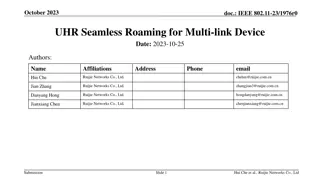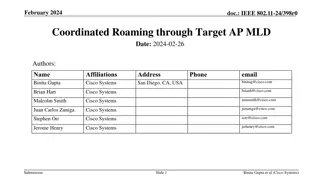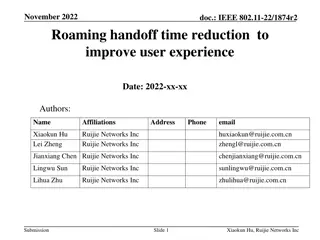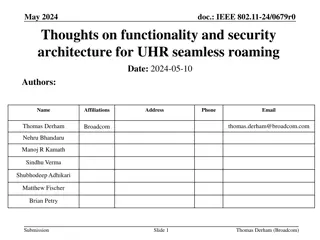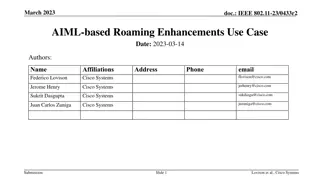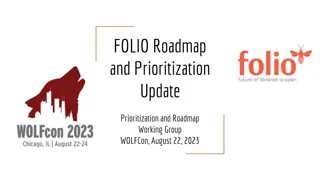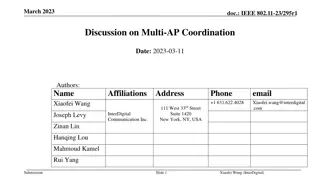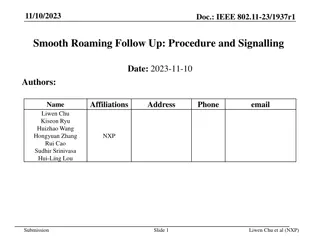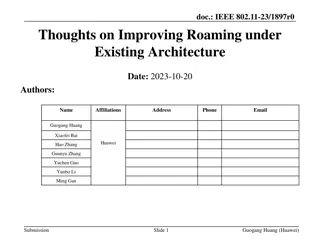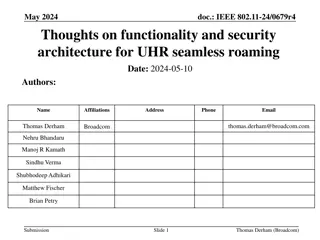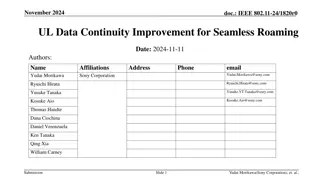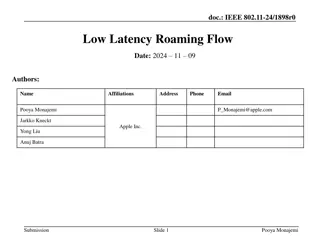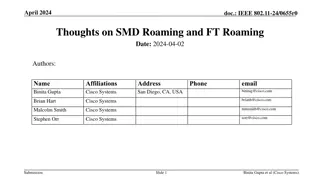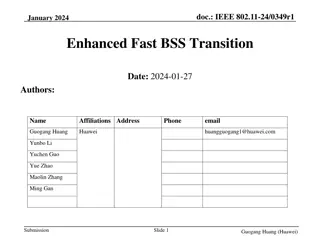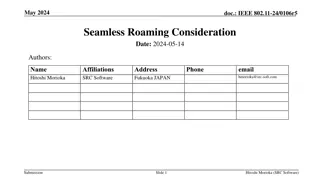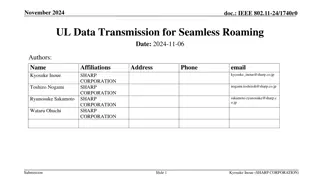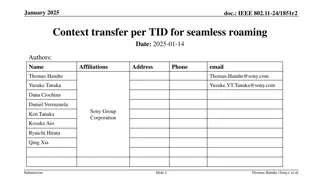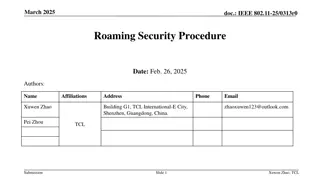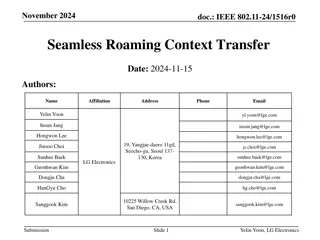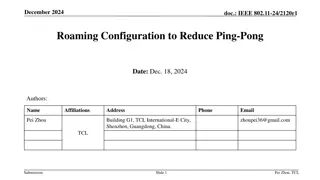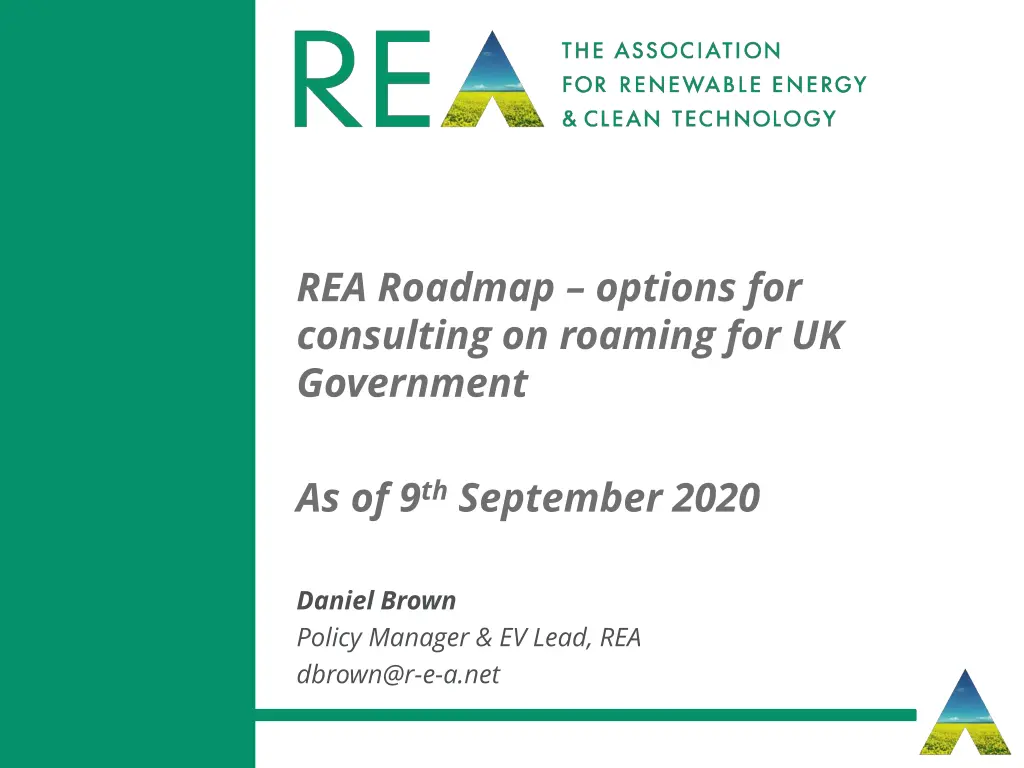
Consulting on Roaming for UK Government: REA Roadmap Options
"Explore the latest roadmap options for consulting on roaming in the UK government as of September 9th, 2020. Discover key principles, lead options, and the evolving market for EV charging payments. Get insights on the government's intention to mandate roaming and enhance the customer experience. Input from REA members and the establishment of EV Roam are also highlighted."
Download Presentation

Please find below an Image/Link to download the presentation.
The content on the website is provided AS IS for your information and personal use only. It may not be sold, licensed, or shared on other websites without obtaining consent from the author. If you encounter any issues during the download, it is possible that the publisher has removed the file from their server.
You are allowed to download the files provided on this website for personal or commercial use, subject to the condition that they are used lawfully. All files are the property of their respective owners.
The content on the website is provided AS IS for your information and personal use only. It may not be sold, licensed, or shared on other websites without obtaining consent from the author.
E N D
Presentation Transcript
REA Roadmap options for consulting on roaming for UK Government As of 9thSeptember 2020 Daniel Brown Policy Manager & EV Lead, REA dbrown@r-e-a.net
Background Market for EV charging payments and roaming has advanced considerably in the UK in the past 12 months Growing driver, ministerial, governmental frustration with lack of roaming and other payment-related public charging issues Government is intending to consult on mandating roaming in forthcoming Consumer Offer consultation (Q4 2020) OLEV requesting language from REA on this topic that is technically and commercially feasible REA members are being asked to input and hone the REA s language Other: REA establishing EV Roam to assign IDACS compliant IDs to eMSPs and CPOs using OCPI to roam
REA principles for roaming in the UK The below principles have informed our process to date: Beyond ad-hoc: any definitions adopted should built on, and go beyond, those outlined in the Alternative Fuels Infrastructure Directive Inclusive of innovation and choice: definitions should not prescribe a single delivery organisation for roaming, should enable multiple business models for delivering roaming (e.g. both peer-to-peer and hubs), and should not inhibit innovation in payments / data from coming forward Build on what s being done: roaming regulation should integrate with / be implemented with an eye to other developments in the sector, including around mandatory data sharing (see OCPD Project Alpha) Ultimately deliver a superior customer experience for drivers: regulations should be implementable, practicable given current technology, enforceable, and result in a simplified and more streamlined experience for individual drivers and fleets
Lead Option: Government requires all public Charge Point Operators to publish a public roaming tariff 1/2 Draft language: All Charge Point Operators in the UK are required to publish and maintain a roaming tariff. This tariff should be the minimum price a CPO would accept for a third-party eMobility Service Provider to pay per kWh to access their charging sessions. Roaming tariffs should be, at maximum, the highest ad-hoc price charged by a Charge Point Operator. Charge Point Operators should also publish terms of payment (e.g. expected payment timeframes). Charge Point Operators cannot refuse access to a charging station from an eMSP who is willing to pay the roaming tariff and agree to the published terms. The UK Office for Low Emission Vehicles will nominate an organisation to maintain a public list of roaming tariffs and payment terms which can be amended by Charge Point Operators if tariffs change.
Lead Option: Government requires all public Charge Point Operators to publish a public roaming tariff 1/2 CPOs with fewer than 100 DC public charging stations and/or 500 AC stations can satisfy these regulations by registering with one recognised roaming hub. Government should publish and update a list of recognised roaming hubs, which includes Hubject, Gireve, and Plugsurfing. Government should appoint an independent Authority to monitor the market annually to ensure compliance. The Authority should have powers to fine non-compliant entities. Government should mandate that roaming is delivered via open protocols, but not specify any particular protocol. These regulations should apply to public and council owned charge point networks. These regulations should not apply to private (manufacturer owned) networks.
Funding to deliver Lead Option In order to manage the cost for CPOs of delivering this solution, the Government should: Provide funding through Innovate UK to address technical issues emerging in the roaming market, including around the standardisation of APIs and around ensuring that customer data (also known as digital identify) remains intact as it is passed between market actors ( 100k requested initially). Create an additional one-time pot of funding that CPOs can apply for which would help them cover the costs of eMSP integration and/or upgrading legacy infrastructure (to be defined, likely as non-OCPP compliant infrastructure installed prior to 1stJanuary 2015 ). MEMBER REQUEST: if you have information on the costs associated with upgrading most types of legacy infrastructure to be complaint let us know as Government will want a suggested unit cost.
Draft accompanying definitions for consultation The following definitions should be the ones consulted on by Government and introduced in regulation. Charge Point Operator (CPO): A CPO operates one or more charging stations on its own account and is responsible for the installation, operation and service thereof. Electromobility Service Provider (eMSP): An eMSP is a provider of charging services to customers. Such services typically include providing access to charging stations for vehicle users via charging cards or apps, processing requests to charge, and taking payments for charging sessions. A Charge Point Operator may also perform the role of an eMobility Service Provider but for the purpose of these regulations these business functions are considered separate. Roaming: Charge point operators and e-mobility service providers entering into agreements between each other or with an intermediary body that enable customers to use one membership account to access and pay at the stations of multiple charge point operators.
Lead Option - Strengths Strengths: Ensures a minimum level of roaming without Government being prescriptive Allows for alliances and strategic partnerships to be made - CPOs & eMSPs are still free to form deals at rates below the public roaming rate, either negotiated bilaterally or via a roaming hub Integrates with existing processes e.g. Gireve already requires CPOs to publish a roaming tariff Enables membership models to continue - companies who offer a p/kWh discount to those who pay a monthly membership would be able to publish a roaming tariff similar to the non-membership price and their members would maintain their benefits. Avoids situation where CPOs are being forced to comply with terms and prices they are not comfortable with. This may result in roaming in some instances to be as expensive as the normal ad-hoc price but guarantees a minimum level of coverage, ease, and integration between market participants
Lead Option - Strengths Strengths: For those CPOs primarily developing AC charging stations, this would greatly reduce the likelihood that Government in the future mandates credit/debit card payments on AC stations (very costly). Allows for business models where access to AC charging stations is via Apps or QR codes. These regulations would satisfy many Government concerns around the safety of users at charging points, particularly if they struggle to pay and have a low vehicle battery. This would increase the ease of guest (non member) use of charging networks, which supports the ad-hoc regulations required under the Alternative Fuels Infrastructure Directive.
Lead Option - Weaknesses Weaknesses: Requires resources from CPOs to develop a solution and integrate with eMSPs Some concern about the number and size of eMSPs that CPOs would need to integrate with & associated required resources Some older charging stations will need to be replaced or upgraded to be compliant Further work needs to be done around consumer data as it is transferred between market participants.
Lead Option - Roadmap REA roadmap to delivery: September 2020 Government develops it s lead option solution internally and pitches this to Ministers December 2020 Government formally consults on their preferred options June 2021 Government confirms intention to mandate REA vision of roaming solution June 2021 Innovate UK funding competition opens June to December 2021 UK CPOs are able to bid for funding to address industry questions (e.g. around digital identity) and to upgrade older infrastructure June 2022 CPOs publish roaming tariffs and regulations come into force.

